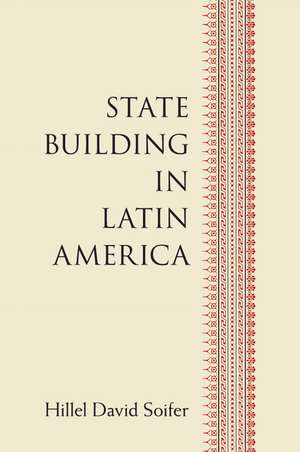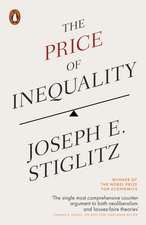State Building in Latin America
Autor Hillel David Soiferen Limba Engleză Paperback – 19 oct 2016
| Toate formatele și edițiile | Preț | Express |
|---|---|---|
| Paperback (1) | 286.71 lei 6-8 săpt. | |
| Cambridge University Press – 19 oct 2016 | 286.71 lei 6-8 săpt. | |
| Hardback (1) | 678.24 lei 6-8 săpt. | |
| Cambridge University Press – 8 iun 2015 | 678.24 lei 6-8 săpt. |
Preț: 286.71 lei
Nou
Puncte Express: 430
Preț estimativ în valută:
54.91€ • 56.57$ • 45.100£
54.91€ • 56.57$ • 45.100£
Carte tipărită la comandă
Livrare economică 24 februarie-10 martie
Preluare comenzi: 021 569.72.76
Specificații
ISBN-13: 9781107518407
ISBN-10: 1107518407
Pagini: 324
Ilustrații: 39 b/w illus. 29 tables
Dimensiuni: 153 x 230 x 18 mm
Greutate: 0.48 kg
Editura: Cambridge University Press
Colecția Cambridge University Press
Locul publicării:New York, United States
ISBN-10: 1107518407
Pagini: 324
Ilustrații: 39 b/w illus. 29 tables
Dimensiuni: 153 x 230 x 18 mm
Greutate: 0.48 kg
Editura: Cambridge University Press
Colecția Cambridge University Press
Locul publicării:New York, United States
Cuprins
Introduction: the origins of state capacity in Latin America; 1. The emergence of state-building projects; 2. A theory of state-building success and failure; 3. Alternative historical explanations and initial conditions; 4. State projects, institutions, and educational development; 5. Political costs, infrastructural obstacles, and tax state development; 6. Local administration, varieties of conscription, and the development of coercive capacity; 7. Conclusion.
Recenzii
'State Building in Latin America can only be described as a magisterial book. Soifer provides both a rich theoretical explanation for why states develop or not and then presents a wealth of data to support his claims. Bringing in the political origins and consequences of bureaucratic recruitment links it to the best work in a Weberian tradition. Important for both those interested in state development and students of the region.' Miguel Angel Centeno, Princeton University, New Jersey
'The biggest obstacle to public goods delivery around the world is not authoritarianism but state weakness. In a model example of comparative-historical social science, Hillel Soifer traces subtle contemporary variations in Latin American state capacity to fascinatingly divergent historical constellations of political geography, ideology, and strategy. Buoyed by original theorizing and buttressed by a wealth of qualitative and quantitative evidence, State Building in Latin America is a book that will last.' Dan Slater, University of Chicago
'This book is a major contribution to our understanding of state-building in Latin America. Soifer shows, as no one else has, that state-building outcomes depended on both early decisions to build the state and the fate of these efforts when undertaken. The explanation neatly combines factors emphasizing ideology and political choices with those stressing the centrality of urban centers during the liberal era. The overall account offers powerful generalizations while simultaneously remaining sensitive to the particularities of state building in Chile, Colombia, Mexico and Peru.' James Mahoney, Gordon Fulcher Professor in Decision-Making, Northwestern University, Illinois
'Variations in state capacity in Latin America boil down to whether state agents, charged with implementing state policy, are recruited centrally and deployed rather than delegated or recruited among local elites. This, in short, is the argument that Temple University political scientist Hillel David Soifer puts forward in State Building in Latin America, an ambitious, wide-ranging, and well-written book.' Paulo Drinot, Current History
'The biggest obstacle to public goods delivery around the world is not authoritarianism but state weakness. In a model example of comparative-historical social science, Hillel Soifer traces subtle contemporary variations in Latin American state capacity to fascinatingly divergent historical constellations of political geography, ideology, and strategy. Buoyed by original theorizing and buttressed by a wealth of qualitative and quantitative evidence, State Building in Latin America is a book that will last.' Dan Slater, University of Chicago
'This book is a major contribution to our understanding of state-building in Latin America. Soifer shows, as no one else has, that state-building outcomes depended on both early decisions to build the state and the fate of these efforts when undertaken. The explanation neatly combines factors emphasizing ideology and political choices with those stressing the centrality of urban centers during the liberal era. The overall account offers powerful generalizations while simultaneously remaining sensitive to the particularities of state building in Chile, Colombia, Mexico and Peru.' James Mahoney, Gordon Fulcher Professor in Decision-Making, Northwestern University, Illinois
'Variations in state capacity in Latin America boil down to whether state agents, charged with implementing state policy, are recruited centrally and deployed rather than delegated or recruited among local elites. This, in short, is the argument that Temple University political scientist Hillel David Soifer puts forward in State Building in Latin America, an ambitious, wide-ranging, and well-written book.' Paulo Drinot, Current History
Notă biografică
Descriere
State Building in Latin America explores why some countries in the region developed effective governance while others did not.


















